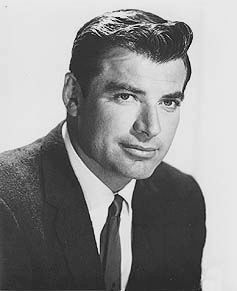This
slightly longer-than-necessary, one-hundred-three-minute British film
is notable for Rod Steiger's gravitating performance along with some
interesting camera positions and closeups in the film's early stages.
His intensity for offbeat, often volatile characters is legendary
though his range seemed to have few boundaries. All other characters fade by comparison. Yet for this film, he is almost
an absurd figure of illogical attitudes and intents while channeling
fellow method actor, Brando. His German accent is no better than
Artie Johnson from Laugh-In television fame with his, “Vely
Intelesting” signature comment. What might have been another signature role, the film's believability factor suffers as he crosses America
by train where the panicked Steiger is placed in some forced,
compromising suspense sequences as he begins his cowardly escape from
justice.
Based
on a short story of the same name by Graham Greene, the film was
produced by The Rank Organisation and directed by Ken Annakin and
filmed at Shepperton Studios, Middlesex, England, UK, and in Spain.
The set-up is quite engaging as Scotland Yard arrives with
embezzlement charges at Steiger's British office. The doors are
opened, providing visual evidence they have the right man as they
witness a self-aggrandizing floor-to-ceiling “Stalinesque”
self-portrait of himself. The music score supports their shocking
revelation. Steiger gets the warning while at his New York office.
With inevitable escape procedures already in place, he arranges his
immediate departure to Mexico for a three-month hideout. Scotland
Yard sends an inspector across “the pond” to apprehend the
condescending embezzler.
The
scheming egoist assumes the identity of a rail passenger by matching
the duped man's passport picture allowing him to cross the Mexican
border. In a heinous act, he shoves the drugged passenger from the
speeding train. Steiger retains the passenger's suitcase for identity
purposes with a plan to dispose of it alongside the road. It
snaps open revealing that the man is wanted in Mexico for the
assassination of a Mexican governor. His unfortunate twist. Perhaps a
major miscue, Steiger's sweaty fingers have apparently lost the man's
passport. But it gets worse. The man survived his abrupt train
departure. Rescued and secretly treated by his “personal” doctor,
the assassin is recovering in a singular motel along a Texas
thoroughfare. Bandaged and in traction from head to toe—similar to the final scene in Its a Mad, Mad, Mad,
Mad World—the man is threatened by Steiger at gunpoint
for his passport.
There
is a fair amount of assuming throughout the film. At least one Porter
on the American train has a British accent. We can assume he found
work overseas. Another character slips in and out of a faint British
accent though he is a lifelong Texas resident. One could
also assume he arranged for his French-speaking girlfriend to join
him on the prairie. Steiger gets apprehended at the Mexican border
and the authorities assume he is their wanted man. But the smug thief
tells them who he really is. They could care less. Steiger is further
stunned. The assassin's wife confesses he is her husband! Hard to
believe there was not an initial question about why he was assuming
that particular man's identity. Finally, Steiger's angry demands
assume he is above the law, even offering a bribe to the Mexican
police chief to get “his” passport back.
The
police chief and the British inspector conspire to keep Steiger
trapped in the Mexican border town to pressure him into
escaping across the bridge back to America for prosecution. But the
agreement is a one-sided affair in Mexico’s favor. He is never
getting out of Mexico. Steiger is content to settle in the town for
as long as it takes. His wealth buys him whatever he desires until
the political assassin’s body is returned home, killed in a Mexican
raid at the motel. I am not sure why the townspeople feel Steiger is
responsible for leaving behind a widow and child, but they band
together, refusing his money or his existence.
Note:
After assuming that unfortunate identity, Steiger is unaware he is
now the owner of an adorable spaniel. Rather risky when the baggage
car handler has to remind him not to leave his previously fawned-over
pet behind. The dog seems to recognize the impersonated face and
follows him around town. When Steiger disposes of the assassin's
suitcase, he also tries to leave the dog behind. Weary and exhausted
from escaping, his life is spared by the whimpering dog alerting him of a scorpion on his trousers. Steiger has a change
of heart toward the dog and it eventually becomes his only friend.
Yet the catalyst for his death.












